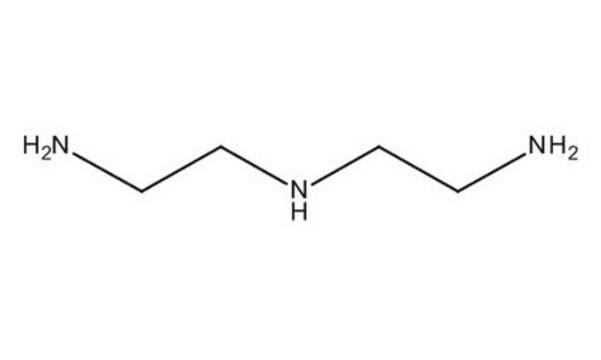T11509
Tetraethylenepentamine
technical grade
Sinónimos:
TEPA, Tetrene
About This Item
Productos recomendados
grade
technical grade
Quality Level
vapor density
6.53 (vs air)
vapor pressure
<0.01 mmHg ( 20 °C)
autoignition temp.
610 °F
refractive index
n20/D 1.505 (lit.)
bp
340 °C
mp
−40 °C (lit.)
density
0.998 g/mL at 25 °C (lit.)
SMILES string
NCCNCCNCCNCCN
InChI
1S/C8H23N5/c9-1-3-11-5-7-13-8-6-12-4-2-10/h11-13H,1-10H2
InChI key
FAGUFWYHJQFNRV-UHFFFAOYSA-N
¿Está buscando productos similares? Visita Guía de comparación de productos
Categorías relacionadas
Application
- To functionalize magnesium 2,5-dihydroxyterephthalate (Mg-MOF-74) to enhance the CO2 adsorption performance of the material.
- To modify magnetic chitosan resin to form amine-bearing chitosan for the efficient removal of uranium from an aqueous solution.
- To synthesize poly(vinyl-chloride)/tetraethylenepentamine (PVC-TEPA) composite material, which is used as an efficient catalyst for the Knoevenagel condensation reaction.
signalword
Danger
Hazard Classifications
Acute Tox. 4 Dermal - Acute Tox. 4 Oral - Aquatic Chronic 2 - Eye Dam. 1 - Skin Corr. 1B - Skin Sens. 1
Storage Class
8A - Combustible corrosive hazardous materials
wgk_germany
WGK 2
flash_point_f
325.4 °F - closed cup
flash_point_c
163 °C - closed cup
ppe
Faceshields, Gloves, Goggles, type ABEK (EN14387) respirator filter
Elija entre una de las versiones más recientes:
¿Ya tiene este producto?
Encuentre la documentación para los productos que ha comprado recientemente en la Biblioteca de documentos.
Los clientes también vieron
Nuestro equipo de científicos tiene experiencia en todas las áreas de investigación: Ciencias de la vida, Ciencia de los materiales, Síntesis química, Cromatografía, Analítica y muchas otras.
Póngase en contacto con el Servicio técnico



















